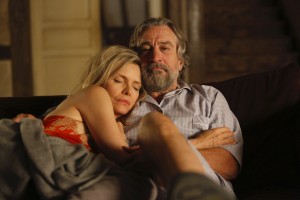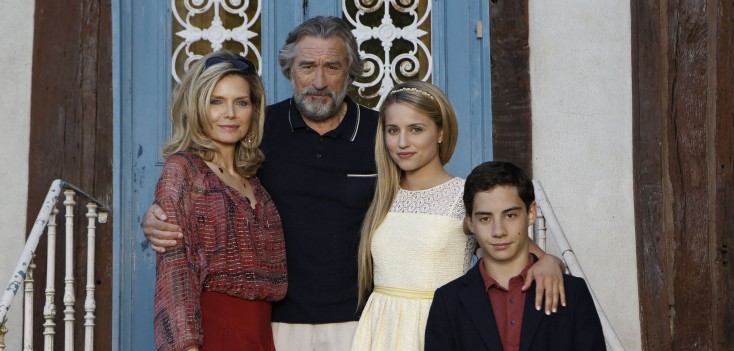
(l-r) Michelle Pfeiffer and Robert DeNiro star in Relativity Media’s “THE FAMILY”. “. © EuropaCorp. TF1 Films Production. Grive Productions. CR: Jessica Forde
By ANGELA DAWSON
Front Row Features
NEW YORK—After co-starring in two films in which their characters never interacted, two-time Oscar winner Robert De Niro and three-time Oscar nominee Michelle Pfeiffer finally get screen time together in “The Family.” They previously co-starred in 2007’s “Stardust” and 2011’s “New Year’s Eve.” Their only interactions from those films occurred off screen, when the two legendary performers ran into each other at the films’ premieres.
The Hollywood veterans now play man and wife, but they’re no Ozzie & Harriet. De Niro stars as Fred Blake, a.k.a. Giovanni Manzoni, a one-time powerful mob boss who enters the witness protection program after snitching on his cronies. His wife, Maggie (Pfeiffer), son (John D’Leo) and daughter (“Glee’s” Dianna Agron) are no angels, either. Though encouraged to keep a low profile when they relocate in to a sleepy town in France, they can’t help but cause a stir with their outlandish ways. Luc Besson (“The Fifth Element”) directs the action-packed comedy.
De Niro and Pfeiffer recently spoke about their latest turn as mobsters at a press day, where they reminisced about working together and getting back into the Family way. De Niro appears less scruffy than he does in the film, where his character is trying to blend in with the locals but has a hard time doing so. The 70-year-old star, of course, has played a string of goodfella characters, starting with young Don Corleone in his Oscar winning performance in “The Godfather, Part II,” and, notably, the Academy Award nominated “Goodfellas.”
Pfeiffer, looking glamorous and sexy at 55, is animated and almost giddy as she addresses questions about the action comedy and co-starring with De Niro. The California-born former beauty queen has played her share of tough molls including “Scarface” and “Married to the Mob.”
Q: What do you think is so appealing about dark themes in this?
De Niro: Everybody is always interested in the dark themes and if there’s humor connected to it, it seems that that helps if it’s a real integral, organic part of the whole thing.
Pfeiffer: It’s what’s taboo. It becomes titillating and becomes part of you. In civilized societies, we spend our lifetimes trying to become what is socially acceptable, but we’re dark and we’re light. We all have both sides to us. It’s living vicariously through these characters on screen, especially in this type of film where you’re horrified and laughing at the same time and you’re ashamed that you’re actually laughing at the horror in front of you. It’s also what makes it so unexpected. So it’s ultimately entertaining.
Q: What do you think are the basic elements that turn an action-comedy into a classic?
De Niro: The human part of it has to be important. In this, it’s the family. There needs to be some grounding in reality; not that you can’t go off in directions, but you’ve got to stay grounded.
Pfeiffer: It’s covering new territory that hasn’t been covered before and it needs a good story. Those two elements, whatever genre it is, the film will become a classic.
Q: Do you see any connection between the character you played in “Married to the Mob” and the woman you’re playing here?
Pfeiffer: It’s really the story of motherhood really. Whether you’re a mob wife or someone from Orange County (Calif.) or Europe, it’s just the mother protector. The only real connection between the two characters is that they are both married to mobsters, but there are a wide variety of those women too. I was really excited to do this because I loved doing “Married to the Mob” for so many reasons, the biggest one being Jonathan Demme. I loved that character and this is really the first opportunity for me to enter back into that world so I was just thrilled and excited and a little bit nervous that people would make comparisons but, ultimately, the characters are pretty different.
Q: Does Hollywood have its own sort of mafia?
De Niro: It has its groups that work together and hang together, like any profession. It’s the same thing with any profession. It’s the same thing with any community or business. They work together.
Pfeiffer: They beat each other up.
Q: Robert, did you re-watch “Goodfellas” for this?
De Niro: I did. I re-watched it and on DVD. There was a lot of stuff I had not seen, like interviews with Henry Hill (the informant depicted by Ray Liotta) and other characters. I wanted to make sure I had everything covered. I spoke to (“Goodfellas” co-screenwriter and author) Nick Pileggi a couple of times. I talked to Luc (Besson, “The Family” director) about that monologue because I wanted to make that it was accurate. I just wanted to make sure it was good.
Q: That was actually in the book?
De Niro: It was. There was a monologue about going back to the neighborhood and stuff but it was not connected to what “Goodfellas” was and the neighborhood. There were specifics that had to be fixed. I looked at the movie and the interviews with people to refresh my mind and so on.
Q: Michelle, your character has quite a saucy mouth. How do you feel about swearing in real life? Are you comfortable with it?
Pfeiffer: Yes. (She laughs.)
Q: What kept the chemistry so alive between you and Robert, and how is your chemistry off screen?
Pfeiffer: As an actor, it doesn’t really get much better than working with De Niro. I didn’t know what to expect really. We’d only met on the red carpet, saying “cheese,” for the opening of two films. He was just delightful in every sense of the word. I was really so relieved to see how generous he was with all of us as actors, as well as giving and open. My only regret is that we didn’t have more scenes together because it was really fun.
Q: Robert, what drew you to this character?
De Niro: Luc (Besson) approached me and gave me the book (“Malavita”) and the screenplay to read. He was just going to produce it after he wrote the screenplay but the way I saw it was it would be darker to get a director to interpret the way he saw it. So he did it himself and that made me really happy because it made everything a lot simpler. It was his vision. He started the whole thing— not that he couldn’t have had a good handle on it as a hands-on producer but it’s tricky. Then Michelle and Dianna (Agron) came on board.
Q: Do you plan on slowing down anytime soon?
De Niro: What am I going to do? Die?
Q: You seem to be working nonstop. Do you think about the fact that you’re a huge reference for young actors?
De Niro: No, I don’t think much about it. I’m aware that people say things (about me) but I enjoy myself. I don’t really do as many movies as you think. My movies are spread out more.
Q: If you had to leave the country in a hurry, what is the one thing that you would not want to leave behind?
De Niro: Real family.
Pfeiffer: Living things inside of the home: animals, children, husbands—not in that order. (She laughs.)
Q: What are the similarities between your family and this onscreen family?
Pfeiffer: Unconditional love. They would do anything for each other and I would do anything for my family—that bond of prioritizing family. (Like my character), I have a daughter and a son, so I have that familial bond.
De Niro: Michelle and I have a similar experience, so it’s all about family, relationship, marriage. We were able to move into this relationship easily, especially with Luc’s writing.
Q: What did you learn from your younger co-stars?
Pfeiffer: The young’uns had been filming for a couple of weeks when we came onboard so they had already found their rhythm and groove. When you come in late, it’s a little intimidating because their work already was on such a level that, frankly, I was a little intimidated. There is a freshness (to acting), and when you do anything for a long time, you have to make a constant effort to keep it fresh and not fall into bad habits and rely on old bags of tricks. I was really reminded to not do that with all of them. John (D’Leo) was my dialect coach—I actually have my own dialect coach—but he wasn’t there on this. My dialect is really from Jersey so it’s always invigorating and rejuvenating to work with young blood.
De Niro: They were great—John and Dianna—they were terrific. That’s all I can say. We had a good time.
Q: Was there some truth to the whole witness protection program and what you went through? Do they really put informants outside of the U.S.?
De Niro: That was a big question I had so I asked some people here if they do that in witness protection, and they said that it wasn’t likely. Luc said he spoke to people in France and there was truth to it. My feeling is that there has to be some way that it’s possible in some strange deal or condition. It could happen. Anything is possible, so I bought it. There was a (plot point) set up where the only compromise between the two governments would be putting our family over there.
Q: What was your favorite scene to shoot?
Pfeiffer: My favorite scene to shoot was probably the couch scene. I liked doing that scene. It was so well written and meaty. It just went so many different places and had a lot of colors.
De Niro: I feel the same way about it. I wish (Michelle and I) had more scenes. Also, I like the last scene.
Q: Do either of you want to write an autobiography?
Pfeiffer: No. (But if I did) it would be called ‘Here But for the Grace of God.”
DeNiro: Ditto.





